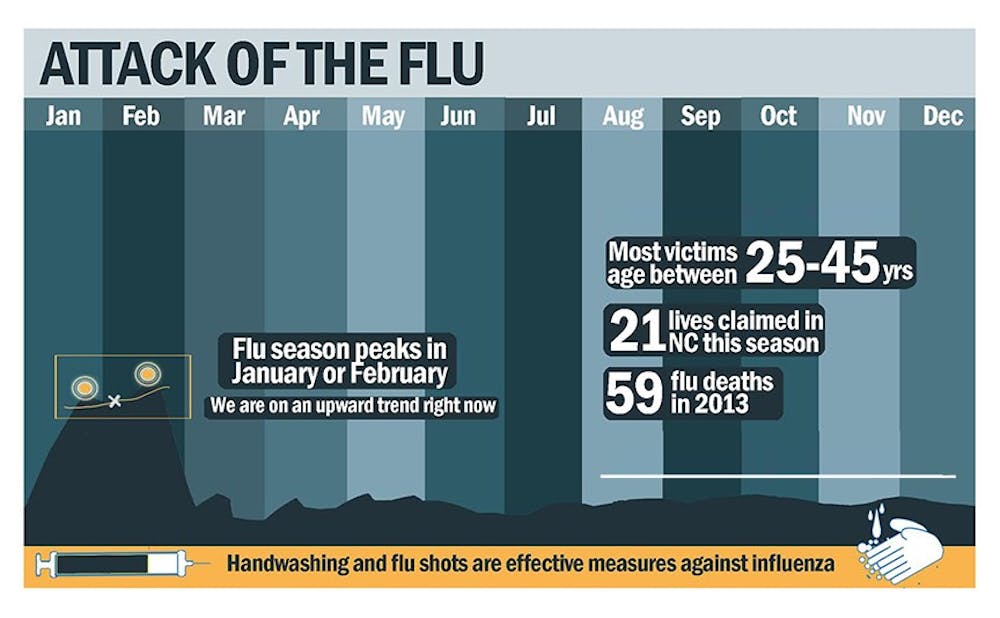Durham county health officials are urging the public to practice clean living habits in anticipation of a busy flu season.
The flu has claimed 21 lives in North Carolina so far this season, with the first confirmed cases early last December. The victims include a disproportionately large number of adults ages 25-45. Health officials are attributing the trend to the prevalence of the H1N1 strain of the disease, which affects a younger portion of the population than other strains.
“There were 59 flu deaths [in 2013],” said Kirsti Clifford, press assistant at the North Carolina department of health and human services. “Flu season varies from year to year. It peaks in February or January, and we are on an upward trend right now.”
Dr. Cameron Wolfe, an infectious disease specialist at Duke Hospital, wrote in an email Thursday that the strain affects a younger segment of the population because the human body has not developed a strong immunity to it.
“Even people who have no obvious risk factors for severe influenza can still get quite sick,” Wolfe said. “Obviously this is relevant to a college campus.”
Clifford said although younger people are more affected by the H1N1 strain, the disease rarely kills unless accompanied by another compromising medical condition, such as cancer or heart disease.
Susan Thompson, the communicable disease program manager at the Durham County Department of Public Health, said the department stresses the importance of flu vaccinations.
“It’s simple to get a flu shot,” Thompson said. “There is no cost. Most students have insurance.”
Wolfe, who noted that the University hospital has been especially busy with flu patients, outlined other ways to avoid getting the sickness.
“Handwashing and trying to minimize rubbing eyes [and the] mouth is probably more useful than we consider,” he said. “Equally, if you get sick, having the decency and respect to self-isolate yourself is important.”
Influenza has not been the only disease on the minds of local health officials. After an outbreak of norovirus in several North Carolina counties last month, state officials issued a press release warning citizens about the disease. Typically, the ailment presents itself with intense stomach pain, cramping, diarrhea and even vomiting.
Thompson said there had been no outbreak of the virus locally, though there may have been individual cases.
“An outbreak is [defined as more cases] than what would normally be expected,” she said. “We have outbreaks every year.”
Wolfe said that there have been no cases of norovirus reported at Duke Hospital, but students should maintain clean habits, such as handwashing just to be safe.
“Norovirus can actually exist in food [and] diarrhea or vomitus for many hours, so sadly that leads to its greater infectivity,” he said.
Julie Henry, a spokesperson at the North Carolina DHHS, wrote in an email that state officials are hard at work spreading the word about all kinds of infectious diseases.
“In addition to regular outreach through news releases and ongoing education through the state’s 85 local health departments, we just wrapped up an advertising campaign promoting immunization of all types,” she wrote.
Thompson said that it was important to get the word out about infectious diseases, but a change in peoples’ behavior was much more likely when it hit close to home.
“When it really gets people’s attention is when it happens to them or someone they know,” she said.
Get The Chronicle straight to your inbox
Signup for our weekly newsletter. Cancel at any time.

